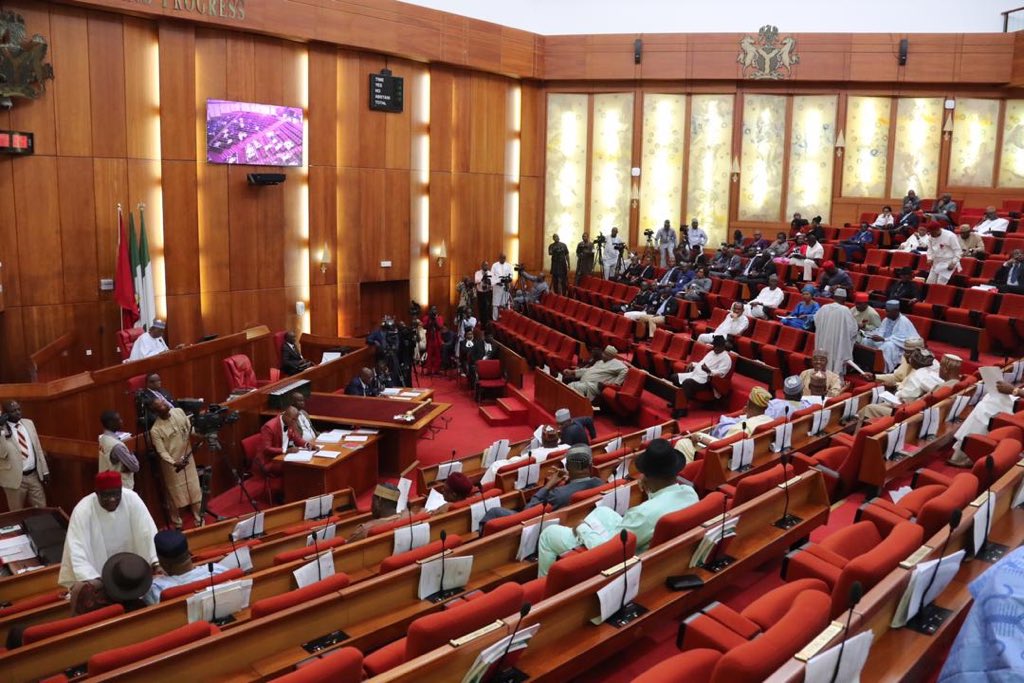Nigeria Benchmark Oil Price At $57/b As It Passes N10.59trn 2020 Budget

The Nigerian Senate on Thursday passed a N10.59 trillion budget for the year 2020 fiscal year, with oil price benchmark set at $57 per barrel.
The budget is predicated on crude oil production of 2.18mbpd, exchange rate of N305 to US$1, as well as Gross Domestic Product (GDP) and Inflation Rate of 2.93 percent and 10.81 percent respectively.
The Senate says the early passage is in keeping with its major legislative agenda of returning the country’s budget cycle to a more predictable one as well as stabilizing the economy.
The 2020 Appropriation Bill was passed into law after a clause by clause consideration of the report of the Senate Committee on Appropriations.
The breakdown shows that N560,470,827,235 is for statutory transfers, N2,725,498,930,000 for Debt Service; N4,842,974,600,640 for Recurrent (Non-Debt) Expenditure; and N2,465,418,006,955 for Contribution to the Development Fund for Capital Expenditure for the year ending on December 31, 2020.
The budget has a Fiscal deficit of N2.2 trillion and Deficit/Gross Domestic Product (GDP) of 1.52 percent.
Capital Expenditure for Ministries, Departments and Agencies of Government (MDAs) for the 2020 fiscal year are broken down as follows: Ministry of Defence N116,181,290,730; Ministry of Foreign Affairs, N7,608,141,474; Ministry of Information and Culture, N7,555,803,233; Ministry of Interior, N34,035,825,302; Office of the Head of the Civil Service of the Federation, N1,722,796,040; Ministry of Police Affairs, N15,959,986,864; Ministry of Communication Technology, N5,919,002,554; and Office of the National Security Adviser, N27,418,469,323.
Others are: Office of the Secretary to the Government of the Federation, N25,188,940,930; Special Duties and Inter-Governmental Affairs, N2,158,620,395, Ministry of Agriculture and Rural Development, N124,395,096,917; Finance, Budget and National Planning, N4,976,199,925; Industry, Trade and Investment, N38,583,331,761; Labour and Employment, N24,445,756,678; Science and Technology, N62,882,531,566; Transport, N121,366,932,571; and Federal Ministry of Aviation, N52,061,533,122.
Also, for the 2020 fiscal year, the Ministry of Power has an allocation of N129,082,499,363; Petroleum Resources, N3,337,444,887; Mines and Steel Development, N10,431,563,177; Works and Housing, N315,563,564,269; Water Resources, N91,679,927,042; Ministry of Justice, N3,853,600,220; Federal Capital Territory Administration, N62,407,154,360; and the Ministry of Niger Delta Affairs, N23,120,350,399.
Others include: Ministry of Youths and Sports Development, N3,735,486,210; Women Affairs, N6,650,300,966; Education, N84,728,529,572; Health, N59,909,430,837; Environment, N12,350,140,731; and Federal Ministry of Humanitarian Affairs, Disaster Management and Social Development, N61,085,146,003.
President of the Senate, Ahmad Lawan, in his concluding remarks after the 2020 budget was passed, noted that with the recent passage of landmark legislations such as the Production Sharing Contract (PSC) Act, Finance Bills and Public Procurement Bills by the National Assembly, the Executive arm of government is sufficiently empowered to ensure the successful implementation of the 2020 budget.





























